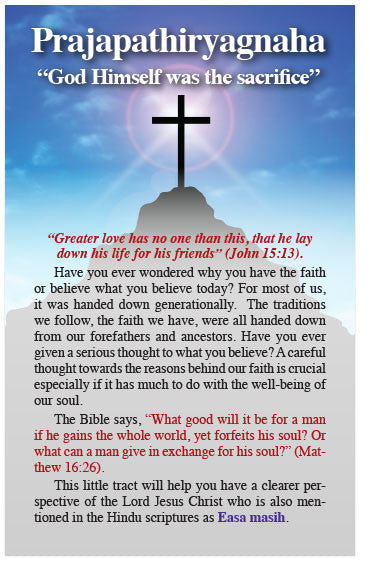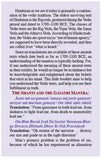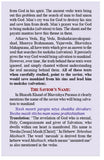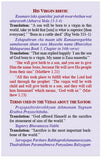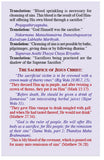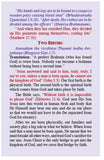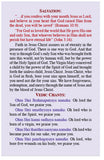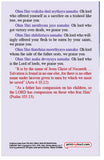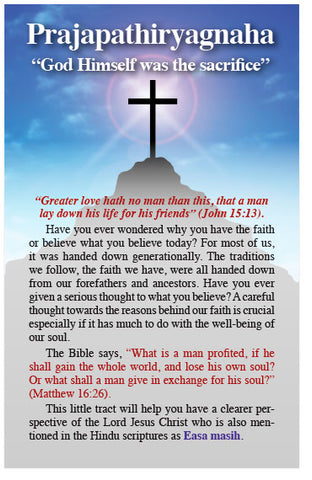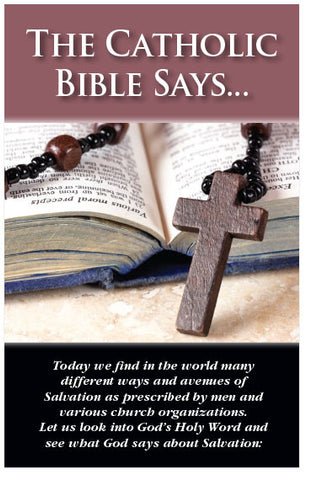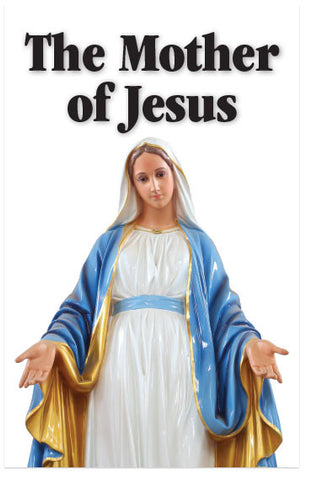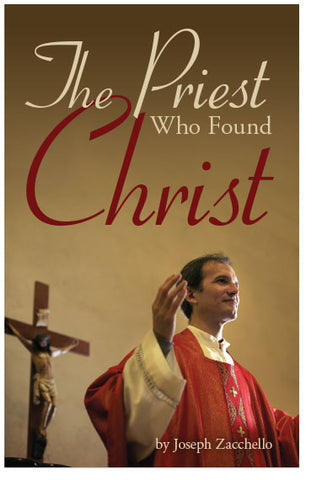Prajapathiryagnaha (NIV)
Special-Order Folded Tract
 NOTE: This item is custom-printed to order (click for more details).
NOTE: This item is custom-printed to order (click for more details).
This tract is from our print-on-demand library, and is not kept in stock. Select the options below, and we will custom-print a batch just for you. Because this item is custom-printed, you can add your custom imprint to the back page at no extra cost.
- Estimated shipping date: Thursday, March 26 (Click for more details)
- SKU:
- Discounts: Discount coupons do not apply to this item
- Format: Folded Tract
- Size: 3.5 inches x 5.5 inches
- Pages: 8
- Imprinting: Available with 5 lines of custom text
- Version: NIV
- Returns: Because this item is custom-printed to order, it cannot be returned.
Show all item details
The full text of this tract is shown below in the NIV version. (Do you want to print this tract in a different version than the one listed? Contact us and let us know what you're looking for—we may be able to create the alternate version for you at no charge.)
“Greater love has no one than this, that he lay down his life for his friends” (John 15:13).
Have you ever wondered why you have the faith or believe what you believe today? For most of us, it was handed down generationally. The traditions we follow, the faith we have, were all handed down from our forefathers and ancestors. Have you ever given a serious thought to what you believe? A careful thought towards the reasons behind our faith is crucial especially if it has much to do with the well-being of our soul.
The Bible says, “What good will it be for a man if he gains the whole world, yet forfeits his soul? Or what can a man give in exchange for his soul?” (Matthew 16:26).
This little tract will help you have a clearer perspective of the Lord Jesus Christ who is also mentioned in the Hindu scriptures as Easa masih.
Hinduism as we see it today is primarily a continuation of the vedic tradition. The oldest surviving text of Hinduism is the Rigveda, produced during the Vedic period and dated to 1700–1100 BCE. The classes of Vedic texts are the Rig Veda, the Yajur Veda, the Sama Veda and the Atharva Veda. According to Hindu tradition, the Vedas are apauruṣeya “not of human agency,” are supposed to have been directly revealed, and thus are called śruti “what is heard.”
Since no translations are available of these ancient texts which date back as far as 1700-1100 BCE, an understanding of the mantras is typically lacking. For, if one understood the meaning of these ancient texts in their totality, he would no longer be in darkness but be knowledgeable and enlightened about the beliefs that exist in his mind. This little booklet aims to help you understand the Vedic texts, and help you see their fulfillment in truth.
The Shanti and the Gayatri Mantra:
āsato ṃā sat gamayā / tamaso ṃā jyotir gamayā / ṃrityor-ṃā āmritam gamayā / Om śānti śānti śāntiḥ
Translation: “From ignorance to truth lead me, from darkness to light lead me, from death to immortality lead me.”
Om Bhūr Buvaḥ Svaḥ Tat Savitur Vareṇyaṃ Bhargo Devasya Dhīmahi Dhiyo Yo Naḥ Pracodayāt
Translation: “Oh creator of the universe … destroy our sins and guide us in the right direction”
Man’s primary problem is the problem of sin, because of which he has experienced an alienation from God in his spirit. The ancient vedic texts bring out this problem and the search of man to find union with God. Man’s cry was for God to destroy his sins and save him from death. Man’s prayer was for God to bring moksha (salvation) to him. The shanti and the gayatri mantras have this theme in them.
Atharva Veda, Rig Veda, Bruhadaranyakopanishad, Ithareya Brahmanam, Yajurveda, Bhavishya Mahapurana, all have texts which give an answer to the soul that searches for moksha (salvation). It precisely gives the way God would bring salvation to mankind. However, over time, the truth behind these texts were ignored, and simply chanted without understanding the real meaning behind them. All of these texts when carefully studied, point to the savior, who would save mankind from his sins and lead him to moksha (salvation).
The Savior’s Name:
In Bharath Khand of Bhavishya Puranas it clearly mentions the name of the savior who will bring salvation to mankind:
Yeesh moorti parapta nitya shuddha shivakari: Yeesha masih itticha mam nama prathishtatham
Translation: “The revelation of God who is eternal, Holy, Compassionate and giver of Salvation; who dwells within our heart is manifested. His name is Yeesha [Jesus] Masih [Christ].” In Hebrew: Yehoshua Mashiach. The word ‘messiah’ is derived from the hebrew word Mashiach, which means “anointed one” as also mentioned in the vedas.
His Virgin birth:
Koumaro loko ajanishta’ putrah nwarvhethan wai uttaravoth (Atharva Veda 13-3-4)
Translation: “A son will be born to a virgin in this world, take ye hold that [son] is what is superior [than everyone].” “Born in a cattle shed” (Rig Veda 355–1)
Eshaputhram cha maam idhi Kumaareegarbha samahavam Aham easa Maseeha nama (Bhavishya Mahapurana Book 3. Chapter in 34th verse)
Translation: “That man replied happily ‘I am the son of God born to a virgin. My name is Easa maseeha’”
“She will give birth to a son, and you are to give Him the name Jesus, because He will save His people from their sins” (Matthew 1:21)
“All this took place to fulfill what the Lord had said through the prophet: ‘The virgin will be with child and will give birth to a son, and they will call him Immanuel’ which means, ‘God with us’” (Matthew 1:23).
Terms used in the Vedas about the Savior:
Prajapathirdevebhyam Athmanam Yagnam Kruthva Prayaschittaha.
Translation: “God offered Himself as the sacrifice for atonement of sins of the world.”
Yagnovy Bhuvanasya Nabhi
Translation: “Sacrifice is the most important backbone of the world.”
Sarvapapa Pariharo Rakthaprokshanamavasyam. Thadraktham Paramathmeva Punyadana Baliyagam
Translation: “Blood sprinkling is necessary for cleansing of sins. This blood is the result of God Himself offering His own blood through a sacrifice.”
Prajapathiryagnaha.
Translation: “God Himself was the sacrifice.”
Nakarmana Manushtanairna Danasthapasavya Kaivalyam Labhathe Marthyah.
Translation: “Cleansing of sins is not possible by baths, pilgrimages, giving dana or by following dharma.”
Yagnovaa Avathi Thasya Chaya Kriyathe.
Translation: “Sacrifices being practiced are the shadow of the Supreme Sacrifice.”
The Sacrifice of Jesus Christ:
“The sacrificial victim is to be crowned with a crown made of thorny vines” (Rig Veda 10.90.7, 15).
“They dressed Him up in purple, and after twisting a crown of thorns, they put it on Him” (Mark 15:17).
“Before death, He should be given a drink of Somarasa” (an intoxicating herbal juice) (Yajur Veda 31).
“They gave Him vinegar to drink mingled with gall: and when He had tasted thereof, He would not drink” (Mathew 27:34).
“God is the ruler of people. He will offer His body as a sacrifice, for His people; for the remission of their sins” (Sama Veda, part 2: Thandiya Maha Brahmanam).
“This is My blood of the covenant, which is poured out for many unto remission of sins” (Matthew 26:28).
“His hands and legs are to be bound to a yoopa (a wooden pole) causing blood shed” (Brhadaranyaka Upanishad 3.9.28). “After death, His clothes are to be divided among the officers” (Ithareya Brahmanam).
“And when they has crucified Him, they divided up His garments among themselves, casting lots” (Matthew 27:35).
Two Births:
Asmaakam thu visishtaye Thaanni bodha dwijothama (Bhagavat Gita 1:7)
Translation: “A perfect Brahmin (who has found God) is twice born. Nobody can become a brahmin without being born a second time.”
“Jesus answered and said to him, truly, truly, I say to you, unless a man is born again, he cannot see the kingdom of God” (John 3:3). Our first birth is the physical birth. The second birth is the spiritual birth which comes from God and takes place by faith.
The Bible says, “Without faith it is impossible to please God” (Hebrews 11:6). God sent His Son Jesus into this world in human flesh and body that He Himself may bear our sins and die in our place so that we would not have to die (be separated from God for eternity).
After we are born physically, our families and society play a big role in what we believe. When Jesus said that a man must be born again, He meant that we must forsake all other ways, and trust God’s sacrifice for our sins. Jesus Christ is the only bridge to get into the kingdom of God, and we cross that bridge by faith.
Salvation:
“…if you confess with your mouth Jesus as Lord, and believe in your heart that God raised Him from the dead, you will be saved” (Romans 10:9).
“For God so loved the world that He gave His one and only Son, that whoever believes in Him shall not perish but have eternal life” (John 3:16).
Faith in Jesus Christ assures us of eternity in the presence of God. There is one way to God. And that way is through God’s only Son who was brought forth into this world, not by human will, but by the power of the Holy Spirit of God. The Virgin Mary conceived a child by the power of the Spirit of God and brought forth the sinless child, Jesus Christ. Jesus Christ, who is God in flesh, bore your sins upon himself, so that you need not die for your sins. We have forgiveness, redemption, and mercy through the name of Jesus and by the blood of Jesus Christ.
Vedic Chants:
Ohm Shri Brahmaputraya namaha: Oh lord the Son of God, we praise you.
Ohm Shri umathyyaya namaha: Oh lord who is born of the Spirit, we praise you.
Ohm Shri kanni sudhaya namaha: Oh lord who is born of a virgin, we praise you.
Ohm Shri tharithra narayana namaha: Oh lord who became poor for our sake, we praise you.
Ohm Shri panchagayaya namaha: Oh lord, who bore five wounds on his body, we praise you.
Ohm Shri vruksha shul arythaya namaha: Oh lord who offered yourself as a sacrifice on a trishool like tree, we praise you.
Ohm Shri mruthyam jaya namaha: Oh lord who got victory over death, we praise you.
Ohm Shri shibilistaya namaha: Oh lord who willingly offered your flesh to be eaten by your saints, we praise you.
Ohm Shri thatchina moorthyaya namaha: Oh lord whom the side of the father seats, we praise you.
Ohm Shri maha devayaya namaha: Oh lord who is the Lord of lords, we praise you.
“It is by the name of Jesus Christ of Nazareth …Salvation is found in no one else, for there is no other name under heaven given to men by which we must be saved” (Acts 4:10,12).
“As a father has compassion on his children, so the LORD has compassion on those who fear Him” (Psalm 103:13).

